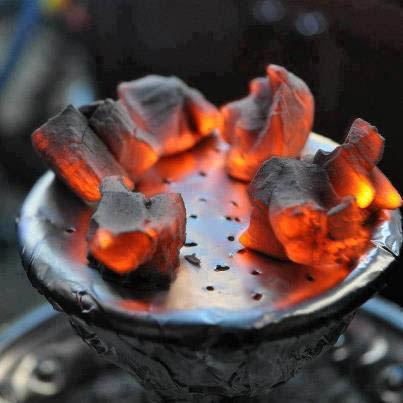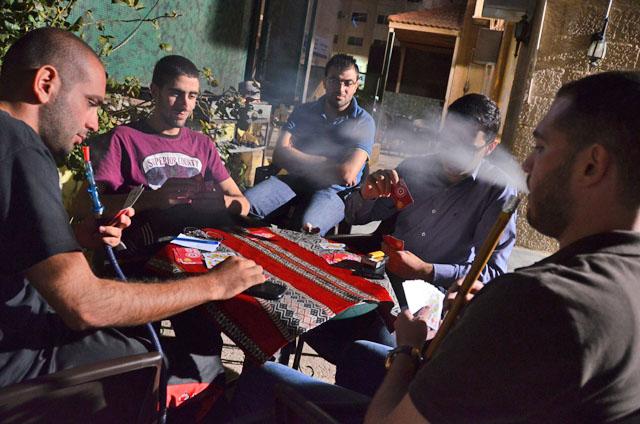You are here
Debate tackles argileh café ban
By Dana Al Emam - Feb 01,2014 - Last updated at Feb 01,2014

AMMAN — Jordanians participating in an open debate were split over the Greater Amman Municipality’s (GAM) recent decision to stop issuing and renewing licences for cafés serving water pipes (argileh).
Amman Mayor Aqel Biltaji said the municipality’s decision came in response to a demand by the Ministry of Health, which sees smoking as “a plague”.
“The [Public Health Law] was passed in 2008, and ever since then, GAM has been considerate of the demands of restaurants and café owners to delay its enforcement,” Biltaji said last Thursday at the debate, organised by the Diwanieh initiative.
The application of the law will go into effect April 1, 2014, since all licences issued to restaurants and cafés that offer argileh expire by March 31, according to the mayor.
Deputy Hind Fayez said she is not against prohibiting smoking in public areas, but she is against the method used to ban it.
“The decision was abrupt and lacked a clear plan,” she said, noting that the application of this law should have started under the Dome of Parliament and in Health Ministry and GAM facilities.
Fayez proposed launching anti-smoking awareness campaigns for children and incorporating related material in school curricula.
For his part, former health minister Zeid Hamzah said it shocks him that some people are against banning smoking in public areas, despite the well known health risks associated with smoking and passive smoking.
He added that there is a difference between enjoying personal freedom and harming others.
Issam Fakhr Eddin, head of the Jordan Restaurants Association, said the association respects the Kingdom’s commitment to international health agreements that ban smoking in public areas.
“The smoking ban in public areas should be gradual… and it took first world countries a minimum of 10 years to enforce such a law,” he said, calling for a systematic plan with a time frame to enforce the ban.
Fakhr Eddin highlighted the economic repercussions of GAM’s decision.
“Cafés and restaurants that offer argileh contribute about JD40 million annually to the Treasury in taxes and fees and they provide jobs for around 12,000 individuals,” he said, calling for a new definition of “public places”.”Cafés should be listed as private places for smoking argileh,” Fakhr Eddin said, adding that most café goers smoke the water pipe.
The Public Health Law, which prohibits smoking in public places, was enforced in the Kingdom’s shopping malls and Queen Alia International Airport in March 2009, and in fast-food restaurants in June of the same year.
A Cabinet decision prohibiting smoking in ministries and public institutions went into force May 25, 2010.
According to the law, smoking is prohibited in public places, which include hospitals, healthcare centres, schools, cinemas, theatres, libraries, museums, public and non-governmental buildings, public transport vehicles, airports, closed playgrounds, lecture halls and any other location to be determined by the health minister.
Thursday’s debate was followed by a round of questions and comments from the audience.
Maan Awwad, who owns a café that serves argileh, said he renewed his licence two years ago and was not notified about the ban.
“As a café owner I have no problem with choosing another area to invest my money, but I was not told beforehand about the application of this law,” he told The Jordan Times during the debate, which was sponsored by the Young Arab Voices project, the British Council and the Anna Lindh Foundation.
“I am used to a certain lifestyle, which authorities cannot take away from me overnight,” he added, noting that he had the opportunity to open a café in another Arab country.
Biltaji said GAM is willing to facilitate the licensing of other businesses for owners of argileh cafés.
Sami Hourani, the founder of Diwanieh, told The Jordan Times that the issue is important because it tackles social, economic, health and legal aspects, in addition to touching on personal freedoms.
“We are here to discuss facts and research results on the debate topic,” he said, noting that a Facebook poll shows that around 55 per cent of young Jordanians believe this ban trespasses on their personal freedom.
Related Articles
A few weeks after the authorities decided to implement a ban on smoking argileh in public places, several MPs on Sunday called for allowing the use of water pipes in specific areas.
The Lower House tourism committee on Monday said it is currently working on a compromise to allow smoking argileh in specific public spaces and would issue its recommendations by next week.
Café owners and clientele expressed their outrage over a Greater Amman Municipality (GAM) decision to stop issuing and renewing argileh licences in the capital.















